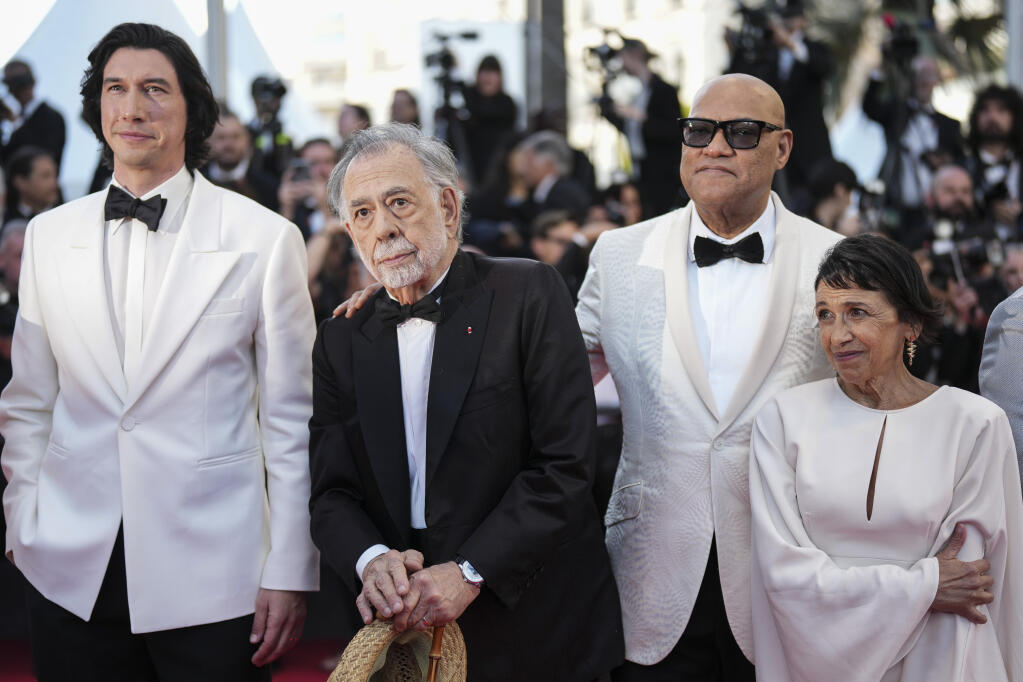
Photo Credit: Getty Images
On Thursday, the Cannes Film Festival witnessed the grand unveiling of Francis Ford Coppola's self-financed magnum opus, "Megalopolis." The 85-year-old director, known for his audacious filmmaking, has been contemplating this wildly ambitious project for decades.
Reviews of "Megalopolis" ranged from descriptions as "a folly of gargantuan proportions" to "the craziest thing I've ever seen." Yet, Coppola once again became the talk of Cannes, much like he did 45 years ago with "Apocalypse Now."
No premiere at Cannes this year generated as much curiosity as "Megalopolis." Coppola invested $120 million of his own money into the film after selling a portion of his wine estate. The film, like "Apocalypse Now," arrived amid rumors of production turmoil and skepticism about its commercial viability.
"Megalopolis" defies easy categorization. It's a futuristic fable set in New York, centered on an architect named Cesar (played by Adam Driver), who envisions a more harmonious metropolis and possesses the extraordinary ability to manipulate time. Though set in the near future, the film is styled as a Roman epic, with New York featuring a modern Coliseum.
The star-studded cast includes Aubrey Plaza as ambitious TV journalist Wow Platinum, Giancarlo Esposito as the mayor, Laurence Fishburne as Cesar's driver and the film's narrator, and Shia LaBeouf as the unpleasant cousin Claudio.
Coppola, donning a straw hat and holding a cane, walked the Cannes red carpet with his granddaughter, Romy Coppola Mars, while the soundtrack to "The Godfather" played. After the screening, the audience gave a lengthy ovation. Coppola then took the microphone to highlight the film's central message.
"We are one human family and that's who we should pledge our allegiance to," Coppola declared. He also shared his fondness for the word "esperanza," which means hope.
Critical reactions were polarized. Some reviews were harsh. Peter Bradshaw of The Guardian called it "megabloated and megaboring," while Tim Grierson of Screen Daily labeled it a "disaster" hindered by "arbitrary plotting and numbing excess." Kevin Maher of the Times of London described it as a "head-wrecking abomination." Jessica Kiang remarked that "Megalopolis" is a folly on par with the fall of Rome.
However, other critics admired the film's ambition. Bilge Ebiri of New York Magazine noted the film might be the "craziest thing I've ever seen." David Ehrlich of IndieWire praised its "creatively unbound approach," despite its lack of dramatically coherent scenes. David Rooney of The Hollywood Reporter pondered whether the film is a work of hubris, a gigantic folly, or a bold experiment, concluding it is "all those things."
"Megalopolis" is dedicated to Coppola's wife, Eleanor, who passed away last month. Coppola is currently seeking a distributor for the film, which has already been acquired for some European territories. Richard Gelfond, IMAX's chief executive, confirmed that "Megalopolis" will play on IMAX screens globally, a format Coppola advocates for viewing the film.
In an experimental twist, during a screening at Cannes, a man walked across the stage mid-film to pose a question to Driver's character onscreen, pushing the boundaries of traditional filmmaking.
Coppola privately screened "Megalopolis" in Los Angeles several weeks before Cannes, where attendees were reportedly baffled by the experimental nature of the film. One attendee remarked, "There are zero commercial prospects and good for him," highlighting Coppola's commitment to artistic vision over commercial success.
Jeff Ian
















